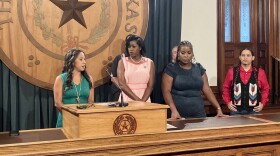After criticizing information some publishers included on climate change and evolution, the Republican-dominated Texas State Board of Education on Friday approved new science textbooks for use in public schools.
School districts don't need to use the materials the state board approved, but many will since those books are guaranteed to comply with state curriculum standards known as the Texas Essential Knowledge and Skills.
The board considered textbook submissions from nearly two dozen publishers when it met last week. Some members asked for changes to how certain materials covered the oil and gas industry, as well as human evolution. Publishers then had the opportunity to make those edits to try to gain the board's approval on Friday.
McGraw Hill was one of the publishers that updated a textbook after the board reviewed it. Republican board members and the conservative group Texas Values had taken issue with information on evolution included in its high school biology textbook.
“Texas Values has always stood for the position that the State Board of Education, when it comes to science materials, [should] make sure that there’s a balanced approach to teaching the origin of life,” Mary Elizabeth Castle, the organization's director of government relations, said. “If evolution is going to be taught, it should be taught as a theory and there should also be room to talk about creation.”
Creationism is the religious belief that God created life out of nothing. In 1987, the U.S. Supreme Court struck down a Louisiana law requiring public schools to teach biblical creation alongside evolution. (Some legal experts think the high court could revisit the issue, though.)
“As an organization we always want to stand for the religious liberty rights of students,” Castle said. “We don’t want students to feel like evolution is presented as fact and their whole-hearted belief that their creation comes from God is shut out of the classroom.”
Castle said Texas Values was especially concerned about a graphic illustrating the evolution of primates, which McGraw Hill ultimately removed to get state board approval.
A spokesperson for McGraw Hill told KUT that its materials are fully aligned with the state curriculum standards.
“None of the requested edits from Texas state officials impact our standards alignment or compromise the academic integrity of the program or students’ understanding of the relevant learning objectives,” Senior Director of Communications Tyler Reed wrote in an email. “Evolution continues to be covered appropriately in our titles.”
While the State Board of Education approved McGraw Hill's revised biology textbook, members rejected other books over how they addressed climate change and what some Republican members said were negative depictions of the oil and gas industry.
Wayne Christian, the head of the Texas Railroad Commission — which regulates the industry — had urged the state board to choose books that were supportive of fossil fuels. Christian said he was happy with what the board ended up approving.
“The Texas State Board of Education did the right thing by rejecting radical environmentalist propaganda on ‘net zero’ and ensuring our students learn the benefits of fossil fuels,” he said in a statement.
The board did approve textbooks that include information about climate change. State curriculum standards the board adopted in 2021 require that students in eighth grade “understand that climate can be impacted by natural events and human activities."
The Texas Freedom Network, a progressive group, has been an outspoken advocate for materials that adequately address climate change. Director of Communications Imelda Mejia said the group saw the board’s vote as progress.
“But it’s pretty clear to us that a number of these textbooks were rejected because the board pressured publishers to make changes based on their own political objections around how they talked about oil and gas companies,” she said.
Mejia said there is nothing radical about teaching students the truth about climate change and what contributes to it.
“Climate change is real and a very serious problem,” she said. “Censoring this information is irresponsible of the board. Students deserve to learn the information they need to understand a crisis they are inheriting and will have to deal with for the rest of their lives.”
Although the state board ultimately voted 12-0 to approve the new textbooks, Democratic members expressed frustration and disappointment that some materials were rejected.
“If we continue to behave this way as a board, my fear is that we will render ourselves irrelevant moving forward when it comes to what publishers want to work with us and will help us get proper materials in front of our young people," member Marisa Pérez-Díaz said, "and for me that’s heartbreaking."
Pérez-Díaz said it is the board’s responsibility to give Texas students access to as many resources as possible.






